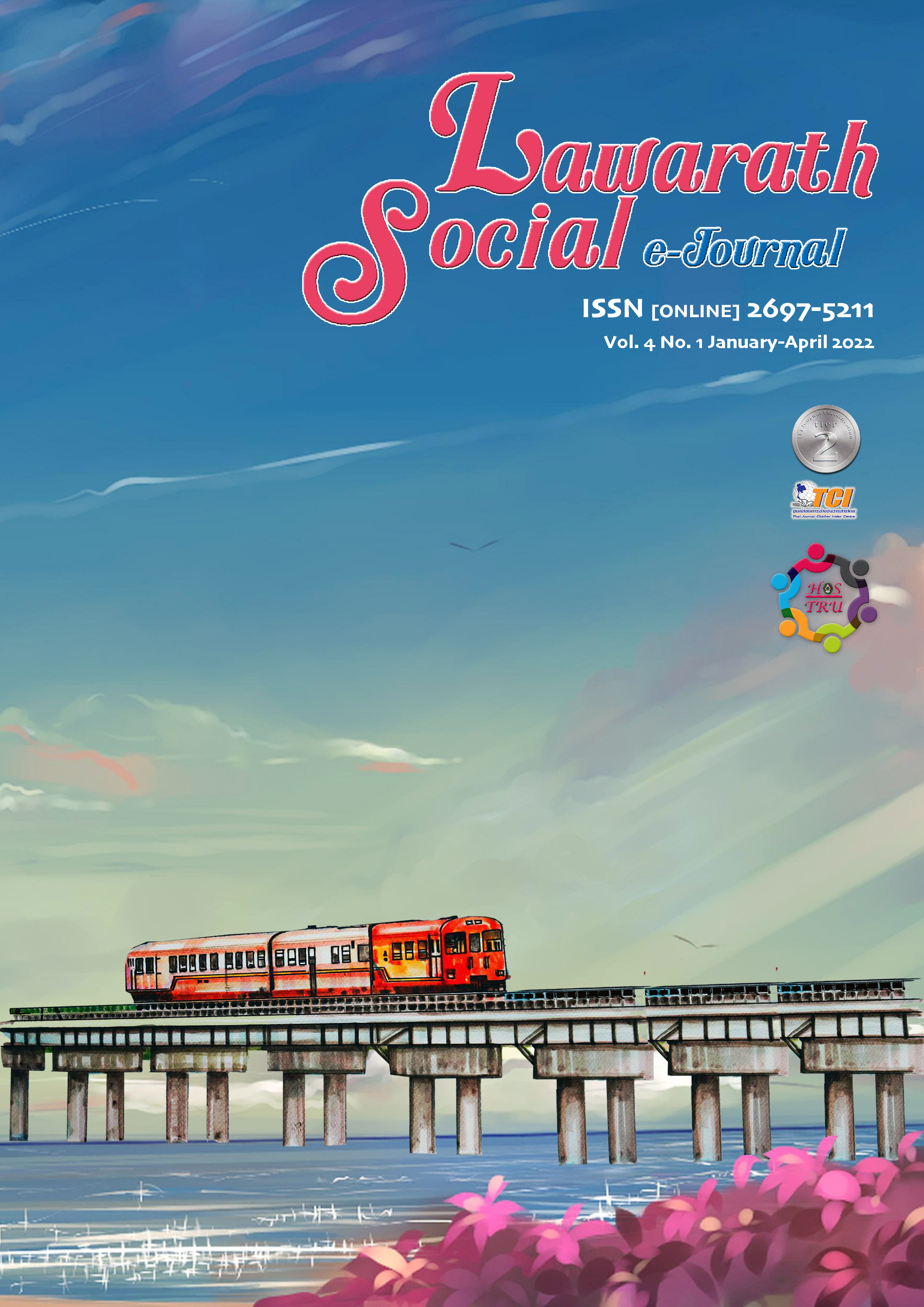Analysis of the Song and Political Communication in Public Policy, Populist, the Kukrit Pramod Government to the Civil State in the General Prayut Chan-Ocha Government
Keywords:
Political Communication, Public Policy, Populist, Civil StateAbstract
This article presents an analytical presentation with the main objective to study the main message of the song that influenced political communication. The article also aims to highlight the importance of the song that is used as a medium or a tool for communicating with people, and as a medium for the continuous transmission of political characteristics and ideologies from 1973 to 1976. The article tends to shed some light on the political and social context that longs for rights, liberties, and democracy. The constitution is called upon through the use of the local folk song to communicate the ideologies and ideas of both students and intellectuals. On the other hand, there was a response from the government through the use of provocative music. Later, in 1992, many artists used the songs to create a political collective consciousness to protest the government. After the 2014 coup d’état led by general Prayut, the song was used as a government’s tool of promising to people through political communication.
The public policy that the Thai governments in various eras used to address the poverty problems, could be presented in two forms which are: “populism” in the government of Kukrit Pramod and “civil state” in the government of General Prayut Chan-ocha. They employed the meaning of the song to express the feelings of people at that time. It pictured the political situation, economy, society, government policies as well as the quality of political leadership. The songs also help to illustrate the behaviors of the leaders in different eras which people could learn and come to their conclusion of what kind of leader Thai society would need.
Downloads
References
กาญจนา แก้วเทพ. (2557). การวิเคราะห์สื่อ: แนวคิดและเทคนิค. กรุงเทพฯ: สำนักพิมพ์จุฬาลงกรณ์มหาวิทยาลัย.
ณัฏฐณิชา นันตา. (2553). วาทกรรมเพลงเพื่อชีวิตในบริบทการเมืองไทย (พ.ศ. 2525-2550). วิทยานิพนธ์ปริญญามหาบัณฑิต จุฬาลงกรณ์มหาวิทยาลัย.
ทิวากร แก้วมณี, และวัชรพล แก้วรักษา. (2550). รายงานการวิจัยสถานะและความก้าวหน้าของวิชารัฐศาสตร์ สาขาวิชาการปกครองในประเทศไทย ระหว่างปี 1990-2007. กรุงเทพฯ: สำนักงานคณะกรรมการวิจัยแห่งชาติ.
นันทวุฒิ พิพัฒน์เสรีธรรม. (2551, มีนาคม-พฤษภาคม). ปัจจัยที่มีผลกระทบต่อการเกิดขึ้นของประชานิยมในประเทศไทย. วารสารเศรษฐศาสตร์ธรรมศาสตร์, 26(3), 119-166.
ปราณี วงษ์เทศ. (2523). พื้นบ้านพื้นเมือง. กรุงเทพฯ: โรงพิมพ์เรือนแก้วการพิมพ์.
พลเดช ปิ่นประทีป. (2558, ตุลาคม 8). วิเคราะห์ความต่าง “ประชารัฐ-ประชานิยม”. คมชัดลึก, 16(101), หน้า 5.
เพลิง ภูผา. (2553). ผู้ก่อการ...ประชาธิปไตย วีรบุรุษหรือกบฏ?. กรุงเทพฯ: บริษัท พิมพ์ดี จำกัด.
มนตรี ศรไพศาล. (2558, กันยายน 22). ประชารัฐ เพื่อราษฎร์และเพื่อรัฐ. ผู้จัดการ, 20(120), หน้า 6.
มหาวิทยาลัยสุโขทัยธรรมาธิราช. (2558). ประสบการณ์วิชาชีพรัฐศาสตร์. นนทบุรี: โรงพิมพ์มหาวิทยาลัยสุโขทัยธรรมาธิราช.
รัชนี อังตระกูล. (2534, กรกฎาคม-กันยายน). โครงการสร้างงานในชนบทกับการพัฒนาชนบทไทย. รัฐสภาสาร, 39(3), หน้า 108.
วาสนา นาน่วม. (2558). “บิ๊กตู่” นายกฯ โหด มัน ฮา. กรุงเทพฯ: สำนักพิมพ์มติชน.
วิเชียร วิทยอุดม. (2551). แนวคิดรัฐประศาสนศาสตร์และทฤษฏีระบบราชการ. กรุงเทพฯ: ธีระฟิล์มและไซเท็กซ์.
สรวิศ ชุมศรี. (2548, สิงหาคม 8). ความทรงจำเมื่อวันวาน. มติชน, 28(10012), หน้า 11.
สุชาติ แสงทอง. (2549). คนกับการเมืองไทย พ.ศ. 2481-2516. วิทยานิพนธ์ปริญญาดุษฎีบัณฑิต มหาวิทยาลัยมหาสารคาม.
สุภาภรณ์ ติ่งอินทร์. (2553). กลยุทธ์การสื่อสารของสมาชิกวุฒิสภา (ส.ว.) ที่เคยดำรงตำแหน่งกำนัน. กรุงเทพฯ: โรงพิมพ์มหาวิทยาลัยธรรมศาสตร์.
อรพิน ผลสุวรรณ์. (2557). กฎหมายการคลัง. กรุงเทพฯ: โรงพิมพ์เดือนตุลา.
อนุสรณ์ ธรรมใจ. (2558, ตุลาคม 9). ประชารัฐ ประชานิยมและรัฐสวัสดิการ (1). กรุงเทพธุรกิจ, 21(221), หน้า 6.
อาทร จันทวิมล. (2556). ประวัติของแผ่นดินไทย. กรุงเทพฯ: โรงพิมพ์อักษรไทย.
อาภากร โรจนบุรานนท์. (2552). การสื่อสารทางการเมืองผ่านบทเพลงเพื่อชีวิต กรณีศึกษา: วงคาราวานและวงคาราบาว. วิทยานิพนธ์ปริญญามหาบัณฑิต มหาวิทยาลัยสุโขทัยธรรมาธิราช.
อเนก เหล่าธรรมทัศน์. (2557). แปรถิ่นเปลี่ยนฐาน: สร้างการปกครองท้องถิ่นให้เป็นรากฐานของประชาธิปไตย. กรุงเทพฯ: สำนักพิมพ์มหาวิทยาลัยธรรมศาสตร์.
Anura, Goonasekara. (1997). Asia and the Information Revolution. Asian Journal of Communication, 7(2), 12-33.
Altheide, David L. (2008). “Medid Logic and Political C0mmunication” in Political communication. London: Sage Publication.
Berlo, David K. (1960). The Process of Communication. New York: Holt Rinehart and Winton.
Peters, Guy. (1996). The Future of Governing: Four Emerging Models. Kansas: Published by The University Press of Kansas.
Merriam, A. (1964). The Anthropology of Music. Illinois: Northwestern University Press.
Sandel, Michael J. (2009). Justice What’s the right thing to do?. New York: Farrar, Straus and Giroux.
Downloads
Published
How to Cite
Issue
Section
License

This work is licensed under a Creative Commons Attribution-NonCommercial-NoDerivatives 4.0 International License.



